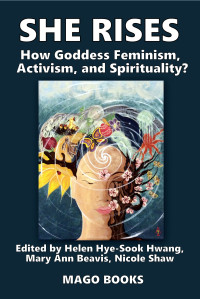 She Rises: How Goddess Feminism, Activism, and Spirituality?
She Rises: How Goddess Feminism, Activism, and Spirituality?
Kathryn Rountree (Professor of Anthropology, School of People, Environment and Planning, New Zealand)
This second volume of She Rises addresses the practical question of how Goddess feminism makes a concrete, vital difference to the everyday lives of its 96 contributors, and, in turn, how these women make vital, concrete differences in the world. It is a glorious and robust tapestry of prose pieces, poetry and art revealing a vast variety of ways in which Goddess inspires women from diverse religious, ethnic, cultural, and disciplinary backgrounds to act. They are stories of boldness, conviction, transformation and love. We read of Carol P. Christ’s decades of environmental activism to save the wetlands of her Greek island home of Lesbos, Harita Meenee’s involvement in the 2011 revolutionary demonstrations in Egypt during the Arab Spring, Beverley Reed Scott’s art installation in the streets of Chicago to commemorate the deaths of nine murdered women, and Morgaine Swann’s determination to embed the Goddess in popular culture by writing Goddess-centric fan fiction. Other women are involved in clinical trauma work, midwifery, art activism, community-building, dance therapy, recycling, growing food and mending clothes, and fighting for justice and against abuse and sexism in a plethora of ways. She Rises brings us stories and creative works which inspire, move, delight, encourage, remind, and challenge us. Here Goddess is not just a divine female or even the female divine. She is the ultimate reality beyond the bifurcation of female/male, light/dark, human/other-than-human beings and all such divisive categories which set one against, and over, the other. She is We and our only hope. She Rises as we rise.
Mary Condren, Th.D. (Author of the Serpent and the Goddess: Women, Religion and Power in Celtic Ireland, and forthcoming books on the Irish and Celtic figure of Brigit)
She Rise: Volume Two” is yet another very important contribution from the Mago Network and many scholars, artists, poets, and activists around the world to the burgeoning fields of feminist spirituality, matriarchal studies, Goddess scholarship and post-colonial consciousness. The name, Mago, may originate in Korea/East Asia, but excavating and celebrating her traditions will empower women from all over the world to reclaim her sisters, under many other names, in their own contexts. May She Continue To Rise.
